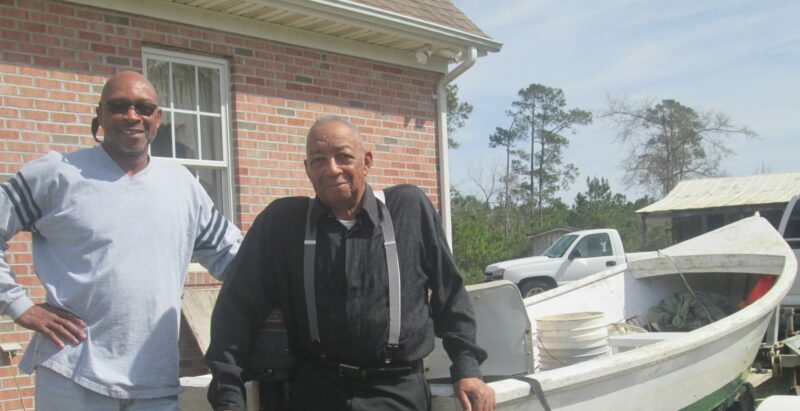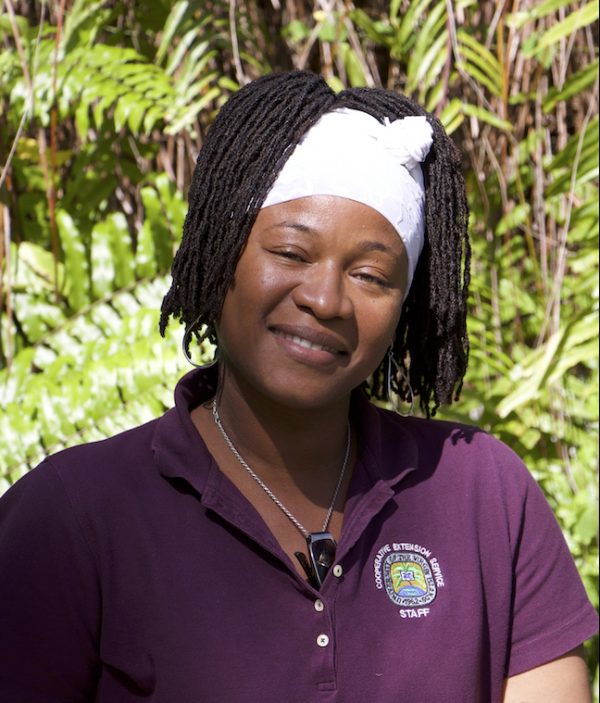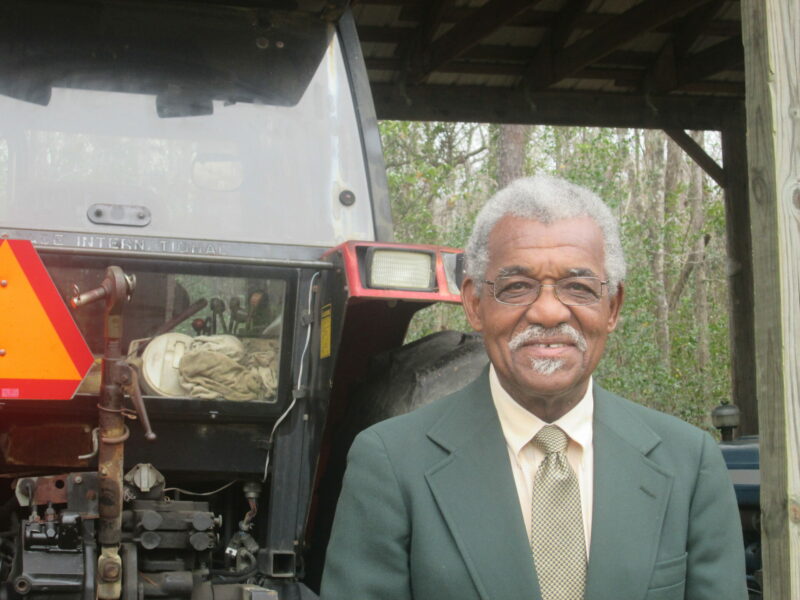Oral histories battling climate change
15 February 2022 – Melody Hunter-Pillion
climate emergency series, preservation, Caribbean history, archives, environment, oral history, climate change, African American history
Editor’s note: Today we continue the “Our Climate Emergency” series with a post by Melody Hunter-Pillion that centers oral history methods as a way to battle climate change.
“It’s different and it’s more severe . . . I’m not the scientists, but I can definitely tell you, it’s happening.”
– Retired North Carolina shrimper Harry Bryant on climate change

Fisherman Harry Bryant (right) with his son Conrad. Bryant’s property borders the Lockwood Folly Estuary in Brunswick County, North Carolina. Photo credit: Melody Hunter-Pillion
No one knows the Lockwood Folly River estuary bordering Harry Bryant’s backyard better than Bryant himself. “You can just see with your eyes that the average tide is higher than it used to be,” Bryant told me during a 2019 oral history interview. His eastern North Carolina dialect turns “tide” into “toid.” To my native Tarheel ear, it sounds both like the lingering British dialect found in pockets of the coast and the Indigenous Lumbee Tribe dialect I grew up hearing from childhood friends. The 84-year-old retired African American shrimper embodies an intimate knowledge of the Brunswick County land and coastal waters that have long been a part of his family’s life and livelihood. Bryant makes no bones about the environmental changes he has seen in the place he knows. “I don’t argue with people about what caused it because I don’t know,” said Bryant. “I’m not the scientists, but I can definitely tell you, it’s happening. You can make up your mind whether it’s manmade or just happening on its own. I would have no basis to argue. It’s happening.” Bryant is an eyewitness to climate change in a distinctive historical space, and his spoken testimony—unique in voice and content—gives researchers a glimpse into the social, political, and economic factors that shape the impact of climate change on marginalized communities. Bryant’s observations are not only a rich primary source but also a practical tool in the community. Through oral history, local knowledge may help identify climate change and complement scientific knowledge to develop resiliency and adaptation tools for coastal Carolina.
Further south, in the warm waters of the Caribbean, natural resources manager Vanessa Forbes recounted her family’s experience in St. Croix when Hurricane Maria hit the Virgin Islands in 2017. “We could see the door inhale and exhale like someone who’s having a difficult time getting oxygen,” she recalled. In the Voices of the Caribbean project with the Southeast Climate Adaptation Science Center, Forbes shared stories her grandparents passed down to her. Like Bryant’s memories in North Carolina, Forbes’ narratives include potentially valuable information about environmental change, its impact, and community experiences.

Vanessa Forbes, Horticulture Extension Agent, University of the Virgin Islands. Photo credit: Melody Hunter-Pillion
Whether in the Caribbean, North Carolina, or elsewhere, oral histories provide customized tools for resilience in communities with distinct ecosystems threatened by global climate change. To make the most of this tool, local knowledge, in the form of oral history, must not only be collected and preserved, but also shared and used by communities, scientists, resources managers, and historians.
Oral history remains a methodology largely unknown to the general public. Expanding archived narratives into news segments, podcasts, and public conversations helps communities to understand the value of their own knowledge, and how to preserve and access that knowledge to adapt in climate crises. The best tools are those that are accessible and offer multiple uses. Bryant’s oral history, as well as testimonies from neighboring African American farmers, are available through the Southern Oral History Program (SOHP) at the University of North Carolina at Chapel Hill. The collection includes a podcast, Masters of our Own Domain, using narrators’ voices in a popular culture format. A video with excerpts from the interviews allowed the North Carolina Department of Environmental Quality to share the work during a public lecture series on Black farmers and their historical struggle for equal citizenship and land.
Land represents a spatial connection between the past and present. The past was never “obsolete” for Blacks, especially in the South. Historian W. Fitzhugh Brundage argues, “The trying adjustments to freedom and the enduring obstacle of white racism encouraged them to see history as an unresolved ongoing process.” Black farmers and fishermen labored to build independent lives for themselves, their families, and their communities, work that continues with the added onslaught of climate change. Historian Thavolia Glymph contends that oral histories connect present challenges with past experiences, making the past more relevant. The podcast highlights interconnections by blending recent narratives with previously archived testimonies, describing Jim Crow era sharecropping, from SOHP’s database.
In a similar fashion, Vanessa Forbes’s interview is preserved through video, audio, and transcripts in the Digital Library of the Caribbean. The array of possible uses includes the examination of climate history, agriculture, folklore, and oral tradition as instructive. Forbes learned from her ancestors when to expect storms like Maria. “Fruits that normally wouldn’t come in at that season came in,” recalled Forbes, “And we knew that was a sign that there was going to be a bad hurricane.”
Oral history is more than the collection of climate data or storm memories from the past. Testimonies record the present meaning community members draw from these climate events to help them make sense of change and develop ways to react that are specific to their spaces.
When the stories of African American farmers and fishermen and Caribbean resource managers go untold and unheard, we lose part of a larger history of the Atlantic World and its future. Black farmers and fishermen continue to occupy contested landscapes, drawing upon a rich oral tradition that has helped them understand, endure, and respond to environmental, social, and economic challenges.

Farmer Lewis Dozier worries about the future of Black land ownership. He encourages young African Americans to buy property and become farmers. Photo credit: Melody Hunter-Pillion
Public conversations offer communities ways of sharing their observations of changing weather patterns in their own communities, linking those changes to the land and to their histories. Farmer Lewis Dozier recognizes his vocation’s inherent dependence on climate. “I always tell fellas in other professions, ‘If the weather’s bad you can just hold it, but you put a seed in the ground, there’s no turning back,’” said Dozier. “Something’s changing. I’m not suggesting it’s changed more than ever, but there’s something happening within the last few years that hasn’t happened before. There’s been a change in the weather.” Oral history can be a powerful tool in understanding how communities experience, interpret, and respond to those changes.
~ Melody Hunter-Pillion is an N.C. State University public history doctoral student and an experienced broadcast journalist. She creates exhibits and media exploring African American history and oral tradition. Melody’s work for the North Carolina Department of Natural and Cultural Resources includes NC Civil Rights Trail, Africa to Carolina, and A Storied Past. Her climate change projects feature NC and Caribbean voices.



